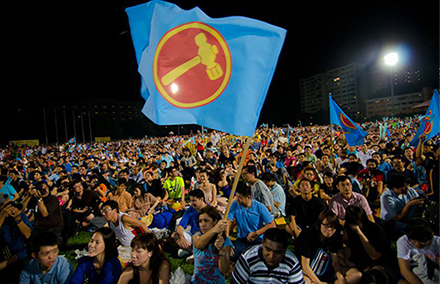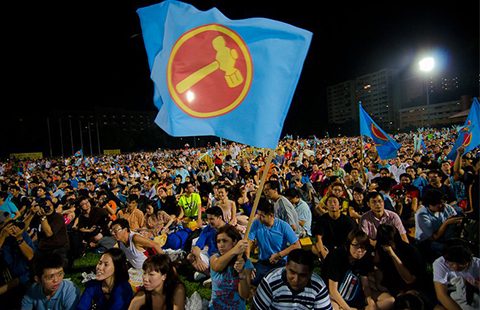
Regardless of this Friday’s election result, a lack of trust with government and desire for transparency among youth will mean a new politics in the island nation.
The new edition of Comet in Our Sky: Lim Chin Siong in History was launched on Sunday 30 August just before nomination day for Singapore’s 2015 General Elections.
Charting the story of the influential leftwing politician and trade union leader from the 1950s and 1960s, the book was well received.
Among the youth, there is a great interest in knowing about Lim Chin Siong and the People’s Action Party (PAP) history of that period. For good reason.
Lim Chin Siong was detained without trial twice in his life: first under Lim Yew Hock’s government from 1956-1959, and subsequently under Lee Kuan Yew’s government from 1963-1969, during Operation Coldstore.
There were two launches for the book; one for a Chinese-speaking audience and the other for the English educated. As expected, the morning book launch in Chinese drew an older crowd, people who had some association with the left in their younger days. They came to listen, more than 100 of them packed into the room. There was no reason to be surprised that they came. Chin Siong was someone they admired greatly.
What was a surprise was that the room was also packed to capacity during the afternoon launch in English. I did not expect to see so many young people in the audience. They are keen to know more about Singapore’s history, and when you talk to them, you can see most of the people, especially the younger people, want change.
The younger people are far better educated. They do not want to be told what to do. They want to participate. They want transparency. They want facts. As Singapore’s ruling party since 1959, PAP has so far not been transparent with them in its dealings.
We all know the current economic situation in Singapore is not rosy.
The younger generation is afraid that they will lose their jobs in their 40s and have no money to live on when they retire. They are not happy that their CPF monies (compulsory savings for retirement as mandated by the government) will be given back to them in drips and drabs and not as a lump sum payment (which was originally conceived). Even then the amounts, percentages and the age that they can withdraw are being modified continually by the government.
There is now a lack of trust in the government and this is reinforced when the youth look at history, especially the period of Lim Chin Siong.
Take the issue of pak mata (“beat up the police” in the Chinese Hokkien dialect), which the Lim Yew Hock government accused Lim Chin Siong of saying in a rally. The PAP government has never corrected the Lim Yew Hock government of this blatant lie although Lee Kuan Yew was there on the very same platform as Lim Chin Siong in that rally at Beauty World on 26 October 1956.
The Lim Yew Hock government, with the connivance of the PAP, provoked the rioting of October 1956 in order to arrest and imprison Lim Chin Siong and get him out of the way. Until today Lim Chin Siong has been labelled as an instigator of violence by the PAP government citing this rally speech.
However, this has been proven to be a lie as the British Archives had kept a transcript of the original Lim Chin Siong’s speech where he called the “police” as “friends” and urged the people not to vent their anger at them. Both Lim Yew Hock and Lee Kuan Yew saw Lim Chin Siong as a threat because he was a sincere and able young man with a large following and great leadership capabilities.
Today, the people of Singapore are increasingly sceptical of the PAP-government assurances; they want change. They want more transparency.
While PAP will, most likely, continue to form the next government – with their gerrymandering of constituency boundaries and the fact that they are fielding 89 candidates to contest every seat compared with the next largest opposition party, Workers’ Party, which is only fielding 28 candidates – it is interesting to note that opposition parties have come together to avoid three-corner fights in all constituencies except for one. The other two three-corner fights are with independents.
What this means is that the people’s vote will be either pro-PAP or anti-PAP. Thus, what is significant at the end of the day is, not the number of seats (gerrymandered!) but, the total vote for PAP compared with previous elections.
Even in a scenario that PAP still forms the next government after this Friday’s election, this desire for change by young Singaporeans will cause much redirection in PAP and impact upon its policies after the elections.
This groundswell for change and more change is unstoppable. The day shall come when Singapore is led by a party in opposition now or a coalition comprising of PAP and opposition leaders.
I believe change is on its way.
Dr Poh Soo Kai was former Assistant Secretary General of the Singaporean political party Barisan Sosialis. He was imprisoned twice under Singapore’s Internal Security Act – which allows for detention without trial – for a total of 17 years by the PAP government.
 Facebook
Facebook  Twitter
Twitter  Soundcloud
Soundcloud  Youtube
Youtube  Rss
Rss 